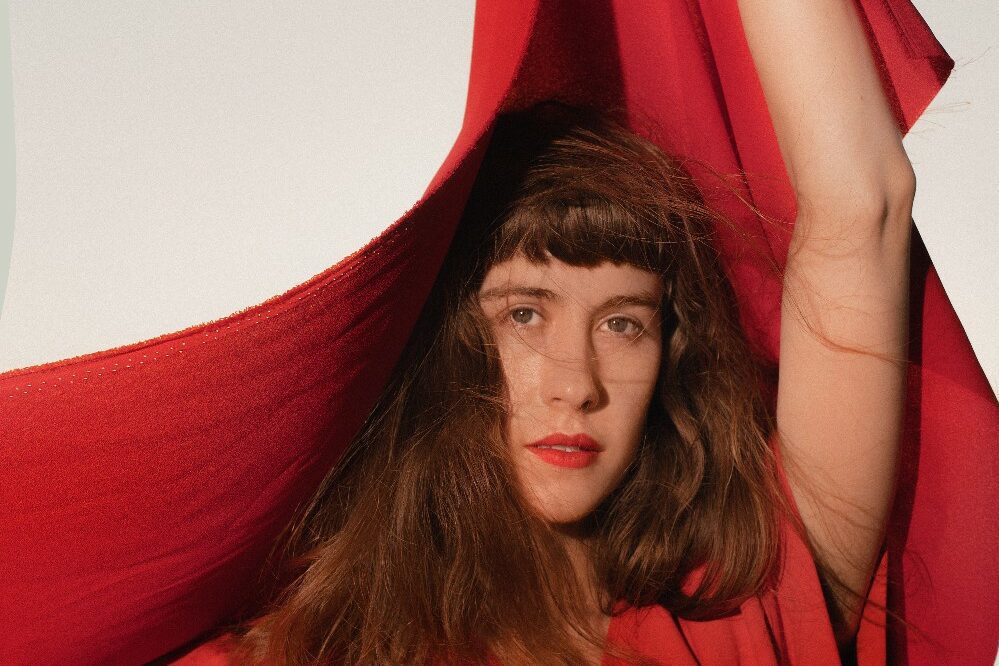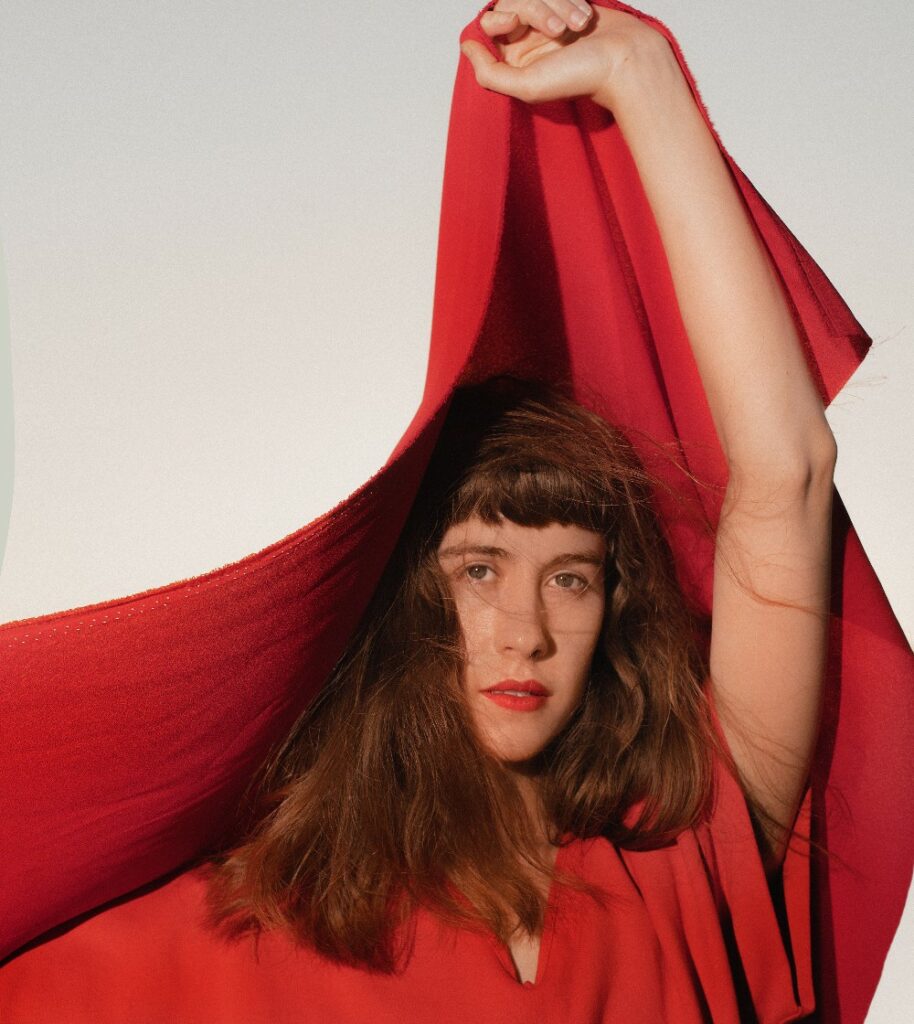

On Vestiges, her debut solo LP as Poise, Lucie Murphy spends a lot of time self-soothing, pumping herself up to face challenges head on, and generally standing her ground with integrity. When we spoke on the phone, she said that the overarching theme that ties Vestiges together is “resilience.” Early singles “Walked Through Fire” and “Show Me Your Love” see the Manhattan-raised, Brooklyn-based musician demand positive recognition outright, and with her fiery swagger, it’s certainly easy to pile on much-deserved praise. But on “New Kind Of Love,” the album’s third and latest single, premiering exclusively via Audiofemme, Murphy turns her affirmations toward a friend in a dire situation, counter-balancing self-assured guidance with sensitivity and grace.
“I wrote it at a time that a friend of mine was in this abusive relationship and a few of my friends and I were trying to figure out the best course of action, because it felt like any intervention would just exacerbate the problem,” Murphy recalls. “It was sort of all I could do for this person – offer my friendship and a place to stay. I could only offer what I had and I couldn’t really do much more and that was very frustrating and heartbreaking.”
What’s especially remarkable about the track is Murphy’s sensitivity to the fact that leaving can be complicated – and sometimes dangerous. “I wanted them to understand that I didn’t think that they were crazy for staying. Of course I can’t exactly understand, but I have sympathy,” she explains. “I tried to say it as succinctly as possible, and get across everything I was feeling.”
Because the situation “New Kind Of Love” describes is sadly all too common, Murphy says she’s been approached by those who can relate, either to her position as the empathic friend whose hands are tied, or as the person to which she originally addressed the song. In both cases, the track provides strength and comfort, and for those that don’t have firsthand experience with scenarios like these, the song is an excellent blueprint for approaching with nuance and compassion. “I’m really proud of that song,” Murphy says. She’s shared it with the person she wrote it about, too. “Thankfully they’re no longer I this relationship so I think they’re doing a lot better. I didn’t say that it was about them, and if they picked up on it they didn’t tell me. But they said they loved the song so that made me really happy.”
For the song’s lyric video, Murphy digitally collaged pictures of her femme friends from her teenage years, when she was first taking an interest in photography. She ended up studying photography and art history in college, seeing it as a more likely career path than making it as a musician (though her first official musical project, a three-piece called Bruise, was rather active, it fizzled before she was out of school). “I think it was a really nice way to repurpose the photos in service to my music, and it’s really nice to have my photo life work with my music life in that way,” Murphy says.
“A big theme of the song is childhood and people changing and growing up and patterns repeating,” she adds. “The person who was in this abusive relationship was someone I’d known for a long time and had a pretty tough childhood also, and I’d known them through all of it. It’s wild looking back at this time; we’ve changed so much but also we haven’t.”
Not only did Murphy edit the lyric video for “New Kind of Love,” she also directed videos for her two previous Poise singles, and is self-releasing Vestiges. “Labels were hit really hard obviously, in this pandemic, and it was honestly really hard to find someone who was willing to start a new relationship at this point,” Murphy says. “I think the next one will probably get a proper label home, but I’ve also learned so much in the process. It’s been cool. I’m excited to learn more and to get it out there.”
As for directing, Murphy says she “had never edited a video before. I just learned Premiere Pro by myself… I’m probably doing everything wrong because I’m not properly trained or whatever. I thought it was gonna be a lot harder than it was honestly, but it was a ton of work.” She has the added benefit of coming from a family who works in film, and growing up close to the industry. Her father, an avid record collector, guitarist, and East Village punk aficionado, made a huge impression on her.
“He was always playing at home and I think seeing him play guitar was like oh I wanna do that, that seems cool,” Murphy recalls. She started playing around the age of 12, and even formed an “after school band” in middle school with her current drummer, Theo Munger. “I started going to DIY shows when I was like 16 or 17 at Silent Barn and Shea Stadium. I heard about Frankie Cosmos and that was really kind of the catalyst that made me be like, oh, I can do this – it just seemed really accessible and inclusive and inviting to me at that time.”
Poise took on a life of its own as Murphy finished up college, with the addition of Munger and guitarist Sam Skinner, who were set to play in her backing band on her first tour under that moniker. But a year of grief, tragedy, and loss almost sidelined the project – Murphy’s father passed away, and just as she was about to get Poise going again, the pandemic hit. Murphy only became more determined and focused – and her resiliency allowed her to complete Vestiges, which is out July 30. “I came to realize this is really what I care about and this is where my community is, and this is really what I love to do and what I think about all the time,” Murphy says. “All of a sudden, having all this time for myself to write, I just kind of birthed this album. I wrote it really quickly because I felt really focused, like, okay, things are not gonna go the way I want them to maybe, so I’m just going to work really hard, be resilient and make this happen somehow, even though it seems kind of impossible.”
With the “impossible” accomplished, Poise blazes their way into the Brooklyn music scene, and are hoping to be able to play Vestiges live soon. The album is a stunning introduction to the person at the very heart of the project; Murphy doesn’t shy away from heavy topics, but remains devoid of self-pity. “I did feel like I needed to make a statement in some way. I think a lot of indie rock can be melodramatic in a way that I totally love sometimes, but is not very ‘me.’” she says. “I don’t want to feel sorry for myself. I feel like, especially when you’re a teenager that’s a lot of what you do. I was like, okay, I’m adult, I don’t wanna do that anymore. That was a big part of the statement – yes, bad things happen, but ultimately things are okay, I’m doing alright, and I’m lucky for that.”

